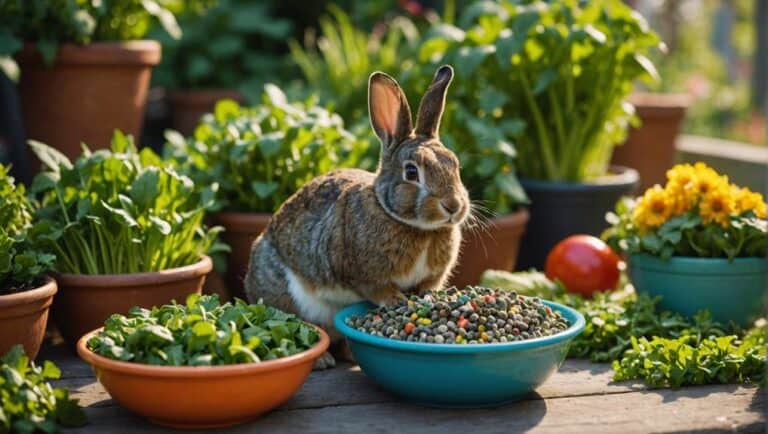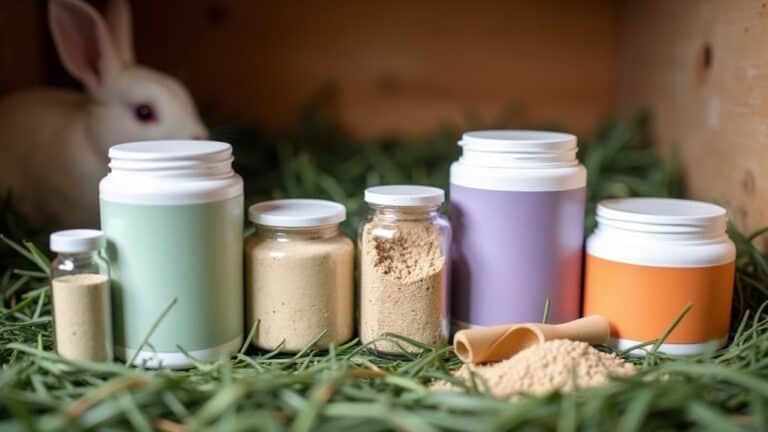When it comes to your rabbit's gut health, the type of hay you choose plays a vital role. You might think all hays are created equal, but certain varieties, like Timothy hay, stand out for their fiber content and digestive benefits. Understanding the differences between grass hays and other options can greatly impact your rabbit's well-being. So, which hay should you prioritize for ideal gut health? The answer might surprise you as you explore the nuances of these dietary choices.
Contents
Importance of Hay for Rabbits
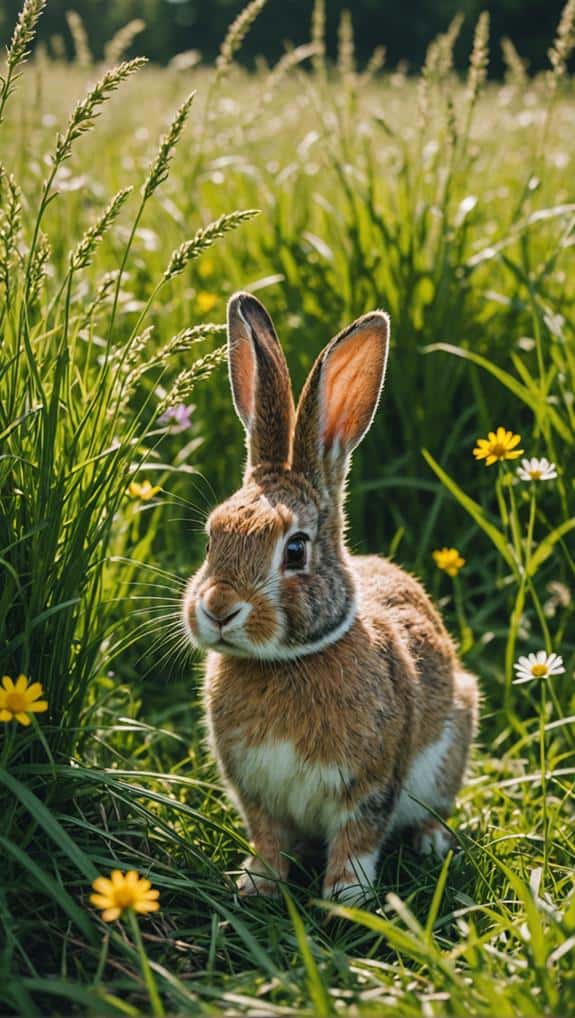
Hay is an essential component of a rabbit's diet, serving as the backbone of their digestive health. Providing unlimited amounts of high-quality grass hay, such as timothy hay, is critical for maintaining your rabbit's digestive system. The high fiber content in hay promotes gut health by aiding digestion, preventing blockages, and ensuring healthy gut motility.
This fiber-rich diet is fundamental for normal stool formation, greatly reducing the risk of gastrointestinal stasis, a common yet serious issue affecting rabbits.
Additionally, the act of chewing hay plays a key role in your rabbit's dental health. It naturally wears down their teeth, preventing overgrowth that could lead to oral pain and further digestive complications.
Regular hay consumption also meets your rabbit's nutritional needs, supplying essential vitamins and minerals necessary for overall well-being.
Best Hay Types for Gut Health
To support your rabbit's gut health, it's essential to prioritize high-fiber hay options.
Hay serves as a primary fiber source important for digestive health, and comparing the nutritional profiles of different hay types, you'll find that varieties like Timothy and Oat hay offer essential fiber that aids digestion and prevents issues like gastrointestinal stasis.
Maintaining a balanced diet with a mix of these hays can enhance overall digestive function and promote healthy gut motility.
Ensuring unlimited access to hay mimics natural foraging behavior, which is beneficial for your rabbit's mental stimulation and physical activity, as noted in the importance of hay in bunny diets.
Importance of Fiber Intake
For optimal rabbit gut health, fiber intake is fundamental, and selecting the right types of hay can make all the difference. A rabbit's diet should consist of 80-90% high-fiber hay, like Timothy hay, to promote ideal digestive health and prevent gastrointestinal stasis.
The preferred fiber content in rabbit hay should exceed 25%, as this is crucial for maintaining a healthy gut, regulating appetite, and avoiding obesity-related digestive issues. It's important to mention that while rabbits may enjoy the occasional carrot, excessive sugar can lead to digestive problems, making high-fiber hay a key component of their diet proper nutrition is crucial.
Incorporating various hay varieties, such as oat hay, can further enhance your rabbit's diet. Oat hay provides coarse fibers and immature seed heads that encourage chewing, which aids in effective digestion. Regular consumption of diverse hays stimulates gut motility, as the different textures and fiber types engage the digestive system.
Introducing hay blends, like meadow hay, can also add variety that prevents boredom and encourages foraging behavior, which is vital for better gut health.
Comparing Hay Nutritional Profiles
Selecting the right type of hay is vital for maintaining ideal gut health in rabbits. Different hays offer varying nutritional profiles that directly impact your rabbit's digestive system. It's important to guarantee that your bunny has unlimited access to high-quality hay, as this forms the foundation of their diet and promotes overall health.
Here's a quick comparison:
- Timothy hay: High in fiber (about 28%), it promotes healthy digestion and helps prevent gastrointestinal stasis.
- Oat hay: Known for its crunchy texture and immature seed heads, it provides a good fiber source while adding variety in taste and texture.
- Orchard grass hay: Sweeter and softer, it encourages greater hay consumption, leading to better gut health and reducing digestive issues.
- Meadow hay: A diverse mix of grasses, it supplies varying nutrients that support optimal digestive function through its rich fiber profile.
While alfalfa hay is high in protein and calcium, it’s not recommended for adult rabbits due to its low fiber content, which can lead to poor gut health if overfed. Instead, adult rabbits should primarily consume grass hay, such as timothy or meadow hay, which provides the necessary fiber for healthy digestion. If you notice your rabbit showing signs of digestive issues, it’s crucial to stop feeding rabbits alfalfa hay altogether and transition them to a more suitable diet. Ensuring they receive a balanced diet will promote their overall health and well-being, preventing potential health problems in the long run.
Prioritizing hays like timothy, oat, orchard grass, and meadow hay guarantees your rabbit receives the necessary fiber for robust digestive health.
Additionally, incorporating a variety of hays can help prevent boredom and encourage consistent eating habits, vital for maintaining optimal gut health in rabbits. Core diet components for American bunnies
Maintaining Digestive Balance
Maintaining digestive balance in rabbits hinges on the type of hay you provide. Timothy hay is often the top choice for its high fiber content, vital for supporting digestive health and preventing GI stasis. Fiber is essential in a rabbit's diet, promoting healthy gut motility and overall well-being.
In addition to timothy hay, consider incorporating orchard grass hay. Its softer texture makes it easier for rabbits with sensitive teeth to chew, while still delivering necessary fiber for digestion.
Meadow hay presents another beneficial option, as it offers a variety of grasses, enhancing nutrient diversity and encouraging natural foraging behaviors.
While oat hay can be appealing due to its crunchiness, it contains higher fat levels and should only be introduced in moderation. However, it still contributes essential fiber and silicates, supporting both digestive health and dental wear.
Nutritional Benefits of Oat Hay
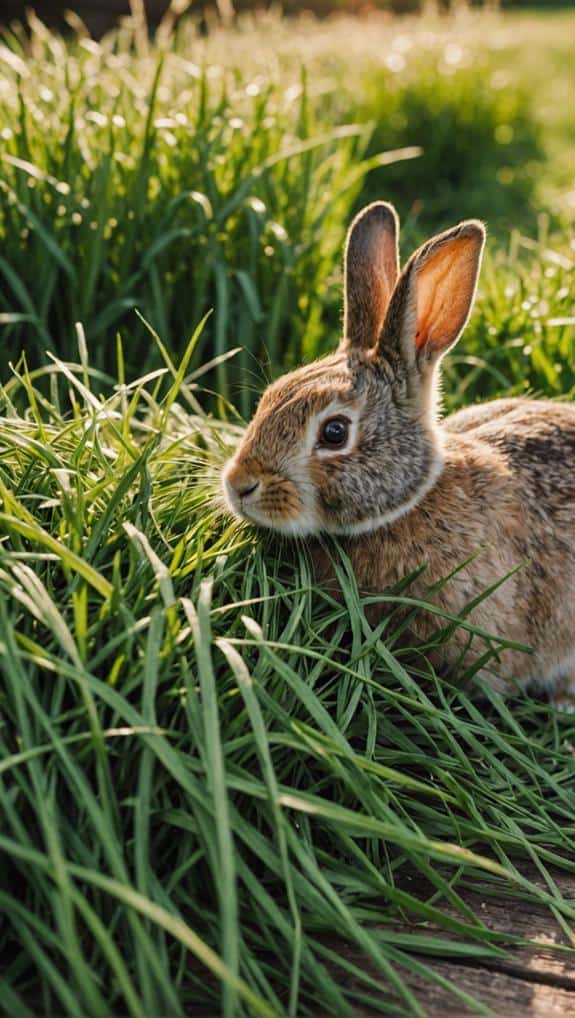
Oat hay stands out as an important dietary component for rabbits, packed with significant nutrients that promote gut health. By incorporating oat hay into your rabbit's diet, you can greatly enhance their overall well-being.
Here are some of the key nutritional benefits:
- High in dietary fiber: Important for promoting healthy digestion and preventing gastrointestinal stasis.
- Supports dental health: The silicates in oat hay aid in natural tooth wear, minimizing the risk of overgrown teeth.
- Rich in vitamins and minerals: These nutrients support gut health and help regulate your rabbit's food intake effectively.
- Encourages prolonged chewing: Its crunchy texture is essential for preventing dental-related issues, maintaining oral health.
Regular consumption of oat hay not only sustains energy levels throughout the day but also guarantees that your rabbit remains active and healthy.
The combination of dietary fiber and important nutrients helps support their digestive systems, leading to better overall health.
Comparing Oat and Timothy Hay
When it comes to providing the best nutrition for your rabbit, understanding the differences between various types of hay is key. Timothy hay is widely recognized for its high fiber content, which supports digestive health and helps prevent gastrointestinal stasis.
Its consistent fiber promotes a balanced digestive process, essential for ideal rabbit health.
On the other hand, oat hay offers a crunchy texture and additional nutrients but contains higher fat and simpler carbohydrates. If overfed, these can negatively impact your rabbit's gastrointestinal function.
While oat hay may be appealing, its protein and calcium levels are higher than those in timothy hay. This can lead to an unsteady gut environment and potential urinary tract issues.
For the best results, consider incorporating primarily timothy hay into your rabbit's diet. This choice guarantees sufficient fiber necessary for digestive health while providing a stable nutrient profile.
You can offer oat hay occasionally for nutritional variety, but moderation is vital to maintain your rabbit's well-being. By understanding these differences, you'll be better equipped to support your rabbit's gut health with the right hay choices.
Feeding Guidelines for Rabbits
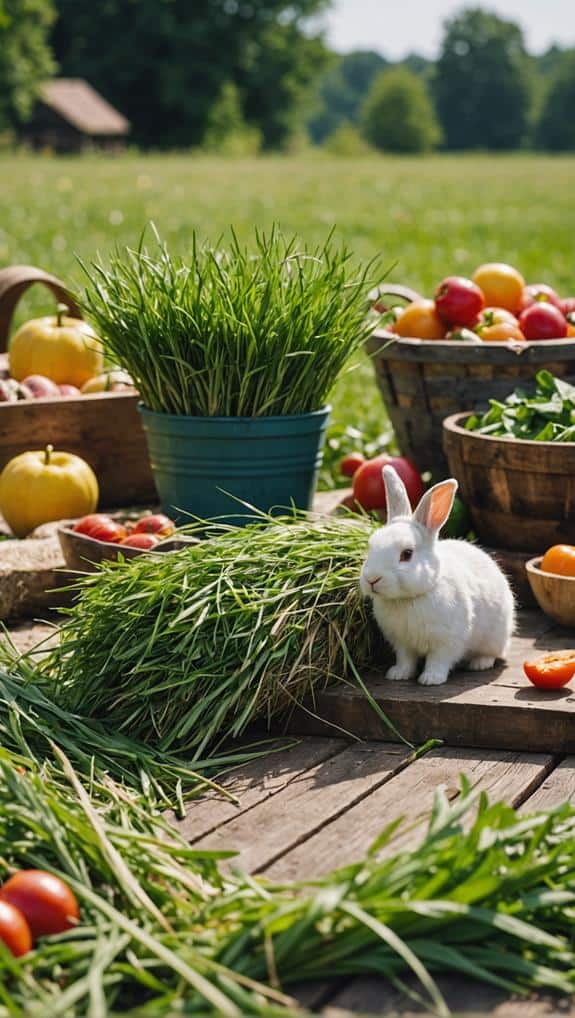
When feeding your rabbit, understanding the different types of hay and their nutritional requirements is essential for ideal gut health.
You should focus on high-fiber grass hays, as they make up the bulk of your rabbit's diet, while also practicing portion control to prevent obesity.
Hay Types Overview
Selecting the right type of hay is essential for maintaining your rabbit's gut health, as each variety offers unique benefits that cater to their dietary needs.
Prioritizing fiber in your rabbit's diet is vital for digestive health and to prevent health risks like gastrointestinal stasis.
Here's a brief overview of hay types you should consider:
- Timothy Hay: The best choice for adult rabbits, with about 30% fiber, promoting healthy gut motility.
- Oat Hay: Nutritious but higher in fat; offer in moderation to avoid reducing gastrointestinal movement.
- Orchard Grass Hay: Soft, sweet, and appealing for picky eaters while still providing essential fiber.
- Meadow Hay: A diverse mix of grasses that encourages natural foraging and prevents dietary boredom.
Nutritional Requirements Explained
Maintaining your rabbit's gut health goes beyond just choosing the right hay; understanding their nutritional requirements is essential.
Rabbits thrive on a diet primarily composed of high-fiber grass hay, particularly timothy hay, which should make up 80-90% of their daily intake. This high fiber content is vital for aiding digestion, helping maintain a healthy weight, and preventing gastrointestinal stasis, a common issue in rabbits.
In addition to hay, you can gradually introduce fresh vegetables around 12 weeks of age. These provide essential vitamins and minerals that complement the unlimited hay.
While pellets can also be part of your rabbit's diet, they should only be offered in moderation. Aim for pellets made from high-fiber grass, serving about ¼ to ½ cup per 5 to 7 pounds of body weight to avoid overconsumption.
Portion Control Importance
Proper portion control is vital for guaranteeing your rabbit's well-being and gut health. Mismanaging portions can lead to obesity and gastrointestinal issues, which are detrimental to your rabbit's overall health.
Here are some key guidelines for effective portion control:
- Provide unlimited access to high-fiber hay, like timothy or oat hay.
- Monitor recommended pellet portions for adult rabbits, which should be limited to ¼ to ½ cup daily.
- For young rabbits, offer unlimited alfalfa hay until they're seven months old, then gradually change to grass hay.
- Adjust hay and pellet combinations based on your rabbit's activity level and weight.
Maintaining proper portion sizes helps promote healthy digestion.
Regular weigh-ins and behavioral observations can guide you in determining the right amounts for your rabbit. By making these adjustments, you can support your rabbit's gut health and prevent potential issues.
Remember, a balanced diet rich in high-fiber hay is important, while keeping an eye on the recommended pellet portions guarantees your rabbit thrives without the risk of obesity.
Your rabbit's health is in your hands; portion control is a key aspect of their diet that you can manage effectively.
Monitoring Rabbit Health and Behavior
Monitoring your rabbit's health and behavior is essential for ensuring their overall well-being, especially when it comes to gut health. Regularly monitoring rabbit health involves keeping an eye on their weight and making necessary weight adjustments to their hay intake. A significant change in weight can indicate health issues or a dietary imbalance that needs addressing.
Fecal output is another critical factor; healthy rabbits produce small, firm, and dry droppings. Any changes in size, shape, or frequency could signal gastrointestinal distress, requiring immediate attention. Additionally, watch for changes in appetite—if your rabbit shows less interest in hay or pellets, it might indicate digestive problems that necessitate prompt veterinary evaluation.
Behavior changes are also important indicators of health. Lethargy, hiding, or altered grooming habits can suggest discomfort or underlying health issues.
Regular monitoring includes conducting routine health checks, particularly dental examinations. Dental problems can severely impact a rabbit's ability to consume hay, thereby affecting their gut health.
Final Thoughts
In the grand scheme of rabbit cuisine, choosing the right hay isn't just a matter of preference; it's a matter of life and digestive happiness. So, while your rabbit may dream of gourmet greens, remember that high-fiber grass hay, particularly Timothy, reigns supreme. After all, who needs fancy salads when your furry friend can munch on pure digestive gold? Prioritize their gut health, and you'll both avoid the drama of a rabbit with a gassy belly—trust us, it's not pretty!


